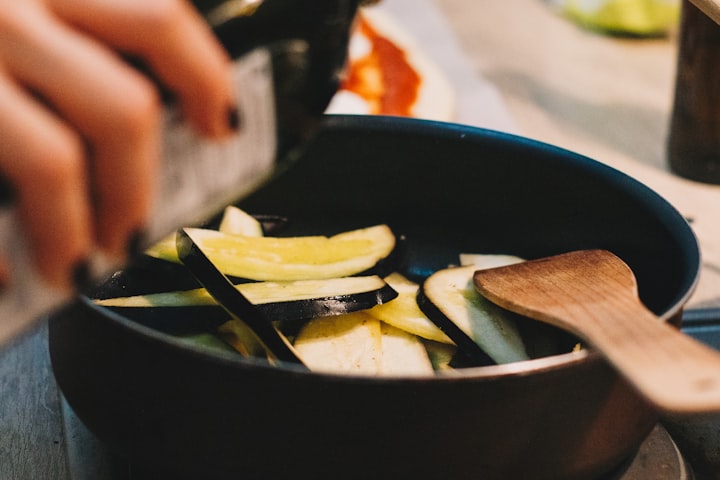The Best Foods for PCOS
(That You Probably Aren't Eating)

In the battle of PCOS vs. diet, you know which side almost every woman with this common hormonal disorder is going to choose.
But what you might not know is just how much impact your diet can have on your symptoms.
And it’s not just about eating less sugar and carbs or cutting out all red meats, beef and pork.
It’s about focusing on eating a variety of whole foods that are packed with nutrients and will help improve your PCOS in as little as two weeks.
With so many restrictive diets available these days — the gluten-free diet, paleo diet, vegan diet, raw food diet and alkaline diet being a few examples
— it can be hard to know where to begin when it comes to changing your eating habits.
What is PCOS?
PCOS stands for polycystic ovary syndrome. The condition can affect women in different ways, but it often causes issues with fertility due to an imbalance between male hormones and female hormones.
Symptoms of PCOS include ovarian cysts, obesity, hair growth, acne, and insulin resistance.
Some women with PCOS may have irregular periods, while others have very frequent periods.
The condition can also lead to increased risk of type 2 diabetes. PCOS is treated with medication, lifestyle changes, or a combination of the two.
Medication for PCOS often includes birth control pills or insulin-lowering drugs.
Lifestyle changes may include eating a diet low in sugar and carbohydrates, exercising regularly, and losing weight.
11 Foods for PCOS
These are some of the best foods for PCOS. If you have the condition, it’s recommended you make this part of your regular diet.
Go Dark & Leafy With Greens Dark leafy greens like spinach, kale, Swiss chard and broccoli are some of the best foods for PCOS.
They are packed with vitamins and minerals, and are especially rich in vitamin A and calcium which help to regulate your hormones.
Other greens like Brussels sprouts, cabbage, and cauliflower are also very nutritious, but should be eaten sparingly due to their high carb content.
Watch the Carbs Carb-rich foods like potatoes, legumes, bread, pasta and grains like oats, corn and quinoa are actually very beneficial for PCOS sufferers as long as they are eaten in moderation due to their high carb content.
This is because carbs are broken down into sugars that help regulate insulin and blood sugar levels, which have a direct impact on your hormones and ovaries.
Rich in Omega-3s: Salmon, Tuna and Eggs Omega-3 fatty acids are very beneficial for women with PCOS.
These acids can help to lower blood sugar and insulin levels, reduce inflammation in the body and decrease the risk of heart disease and type 2 diabetes.
Foods rich in omega-3 fatty acids include salmon, tuna, walnuts, spinach and eggs.
Bump Up The Veggies Vegetables such as broccoli, cauliflower, carrots, squash, brussels sprouts, and pumpkin are very beneficial for PCOS sufferers.
They are rich in vitamins and minerals, and are a great source of fiber.
Vegetables are also low in calories and protein, and loaded with fiber.
Eating a diet high in fiber can help to regulate your hormones. Eat More Eggs Eggs are packed with protein and are very beneficial for women with PCOS.
You can eat them boiled or scrambled, or in omelettes. An omelette made with extra veggies and 2 or 3 eggs will only contain around 150 calories.
High-Fiber Whole Grains Whole grains such as oats, corn, quinoa, and brown rice are packed with nutrients, and a very helpful addition to a PCOS diet.
They are rich in fiber, which is excellent at regulating hormone levels.
Quinoa and oats are especially good at managing insulin levels. Avoid grains and sugar.
If you have PCOS, you should also avoid high-sugar foods and refined carbs, such as sweets, soda, processed foods, white bread, white rice, and pasta.
These kinds of foods are full of sugar and can cause your insulin levels to rise, which can lead to hormonal issues like irregular periods, acne, and unwanted hair growth.
How To Use Flax Seeds For Pcos: A Detailed Guide

In today’s fast-paced world, it’s easy to fall out of balance.
Anxiety about work, school, and home life can lead to stress and poor eating habits—and these factors have been shown to have a negative impact on the health of individuals.
Fortunately, there are many simple ways to reduce stress and improve your diet.
One such way is incorporating flax seeds into your diet.
Users report that consuming flax seeds as part of their daily routine helps them manage their PCOS symptoms because they are rich in fiber, phytochemicals (including lignans), and Omega-3 fatty acids.
To help you understand more about flax seeds and how they can be helpful in managing your PCOS symptoms, we’ve put together this helpful guide so that you can start using them right away!
What Are Flax Seeds?
Flax seeds are tiny, brown seeds harvested from the flax plant.
They’re often used as a source of dietary fiber and omega-3 fatty acids and are a popular choice for health and wellness enthusiasts.
A single tablespoon of flax seeds contains about 2 grams of dietary fiber, 3 grams of protein, and about 90 calories.
They have a nutty and earthy flavor, and they’re frequently used in baked goods.
Flax seeds are also common ingredients in granola and vegetarian burgers.
Flax seeds are unique among edible plants in that they contain significant amounts of both omega-3 fatty acids and lignans.
Omega-3 fatty acids are known to have a wide range of health benefits, including reducing inflammation, improving heart health, and promoting healthy brain development and function.
Lignans are phytochemicals that are thought to have many of the same health benefits as omega-3s.
How Do Flax Seeds Help With PCOS Symptoms?
To understand how flax seeds help combat PCOS symptoms, it’s important to first understand how flax seeds work as part of an overall diet.
Flax seeds contain fiber and phytochemicals that work together to positively impact your blood sugar, insulin levels, and other metabolic processes.
By including flax seeds in your diet on a regular basis, you can improve your PCOS-related symptoms like:
- Irregular menstrual cycles - Hormonal imbalances - Infertility - Excess hair growth - Acne - Cysts - Mood swings - Fatigue These are just a few of the most common PCOS symptoms.
But by incorporating flax seeds into your diet, you can help to combat each of these symptoms and improve your overall health.
Why Is Flax Good For You?
As you now know, flax seeds are rich in fiber and phytochemicals. These are two key nutrients that make flax seeds healthy for you.
Here are a few other benefits of including flax seeds in your diet:
- Flax Seeds Reduce Your Risk Of Heart Disease - Studies show that consuming flax seeds on a regular basis reduces your risk of heart disease by as much as 25%.
This is due in large part to the high amount of omega-3 fatty acids in flax seeds.
- Flax Seeds Can Help You Lose Weight - Flax seeds contain a healthy amount of fiber and protein, which makes them a filling and low-calorie snack.
If you add flax seeds to your diet and eat them throughout the day, you will likely notice weight loss as a result.
- Flax Seeds Are Great For Your Gut Health - The high amount of fiber in flax seeds is great for your gut health.
It can even help to treat the symptoms of irritable bowel syndrome (IBS) by improving your gut health.
- Flax Seeds Help You Manage Your Blood Sugar - One of the most important things you can do for PCOS is to manage your blood sugar.
By eating flax seeds, you can help to lower your blood sugar level and improve your overall health.
How To Use Flax For PCOS?
To get the most out of flax seeds, you should consume two tablespoons of flax seeds each day.
You can use flax seeds in a wide variety of ways, including: - Sprinkle them over salads and yogurt.
- Add them to baked goods. - Make them into flax seed crackers. - Add them to stir-fries and soups. - Make a bowl of oatmeal with flax seeds and milk.
There are a wide variety of ways to consume flax seeds. You can mix them into baked goods, sprinkle them over a bowl of oatmeal, or add them to a stir-fry.
Benefits of Flax Seeds for PCOS
As we’ve seen, flax seeds have a wide variety of benefits that can help you manage your PCOS symptoms.
If you incorporate flax seeds into your diet, you can expect to enjoy the following benefits:
- Improved blood sugar levels. - Improved insulin sensitivity. - A healthier gut. - A reduced risk of heart disease. - Weight loss. - Better mental health. Overall, flax seeds make a great addition to any diet.
They’re easy to add to your daily routine, and they provide your body with essential nutrients.
If you have PCOS and think flax seeds might help, make sure to incorporate them into your diet as soon as possible!
Side Effects of Flax Seeds
Although flax seeds are generally considered to be safe, there are some rare side effects that you should be aware of.
If you experience any of the following side effects, you should consult a doctor:
- Nausea. - Vomiting. - Diarrhea. - Abdominal cramping. If you experience any of these side effects, it’s likely that you have an allergy or sensitivity to flax seeds.
You can test this theory by consuming less flax seeds and slowly increasing your dosage over time.
If you don’t experience any side effects, you should be able to consume two tablespoons of flax seeds safely.
Flax seeds are a great source of fiber, phytochemicals, and omega-3 fatty acids.
These nutrients make flax seeds helpful for those who suffer from PCOS by improving their blood sugar levels, insulin sensitivity, and gut health.
In addition to these benefits, flax seeds also make a great low-calorie snack and can help you lose weight.
If you suffer from PCOS, flax seeds are a supplement that you should try as soon as possible!
Conclusion
You don't have to be a victim of PCOS. The best way to control it is by eating a healthy diet.
This means following a diet rich in whole foods, such as vegetables and legumes.
It also means reducing your sugar intake and eating more fiber.
Following a healthy diet plan might not be easy at first, but it will be worth it in the long run.
And when you consider that PCOS can lead to other health issues such as heart disease, type 2 diabetes, and infertility, it's even more important to keep your diet healthy.
About the Creator
Samson Williams
Hey there, I'm Samson Williams, and I'm all about helping folks like you tap into your full potential through the magic of astrology-based transformation. Ever since I can remember, I've been fascinated by the connections between






Comments
There are no comments for this story
Be the first to respond and start the conversation.